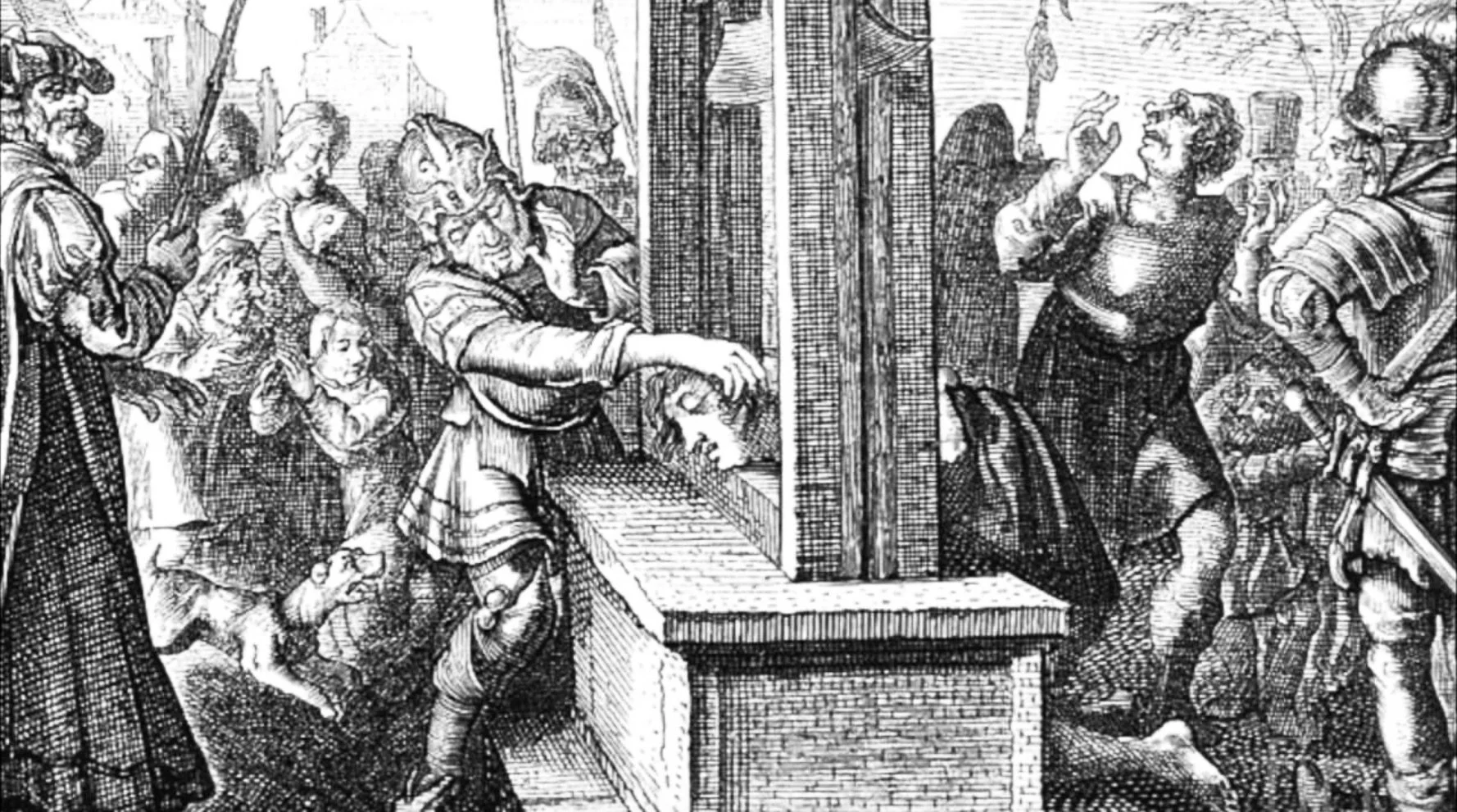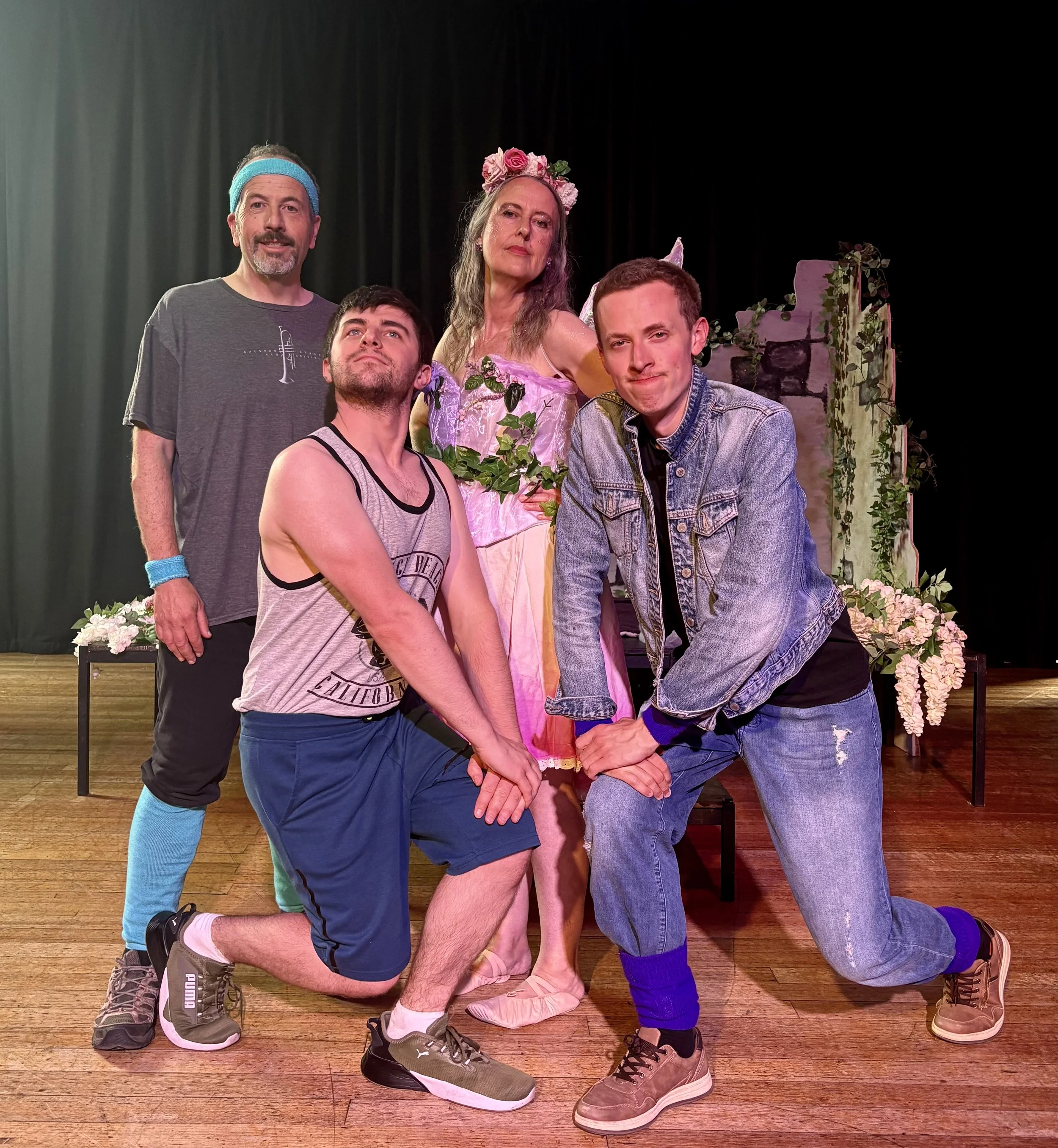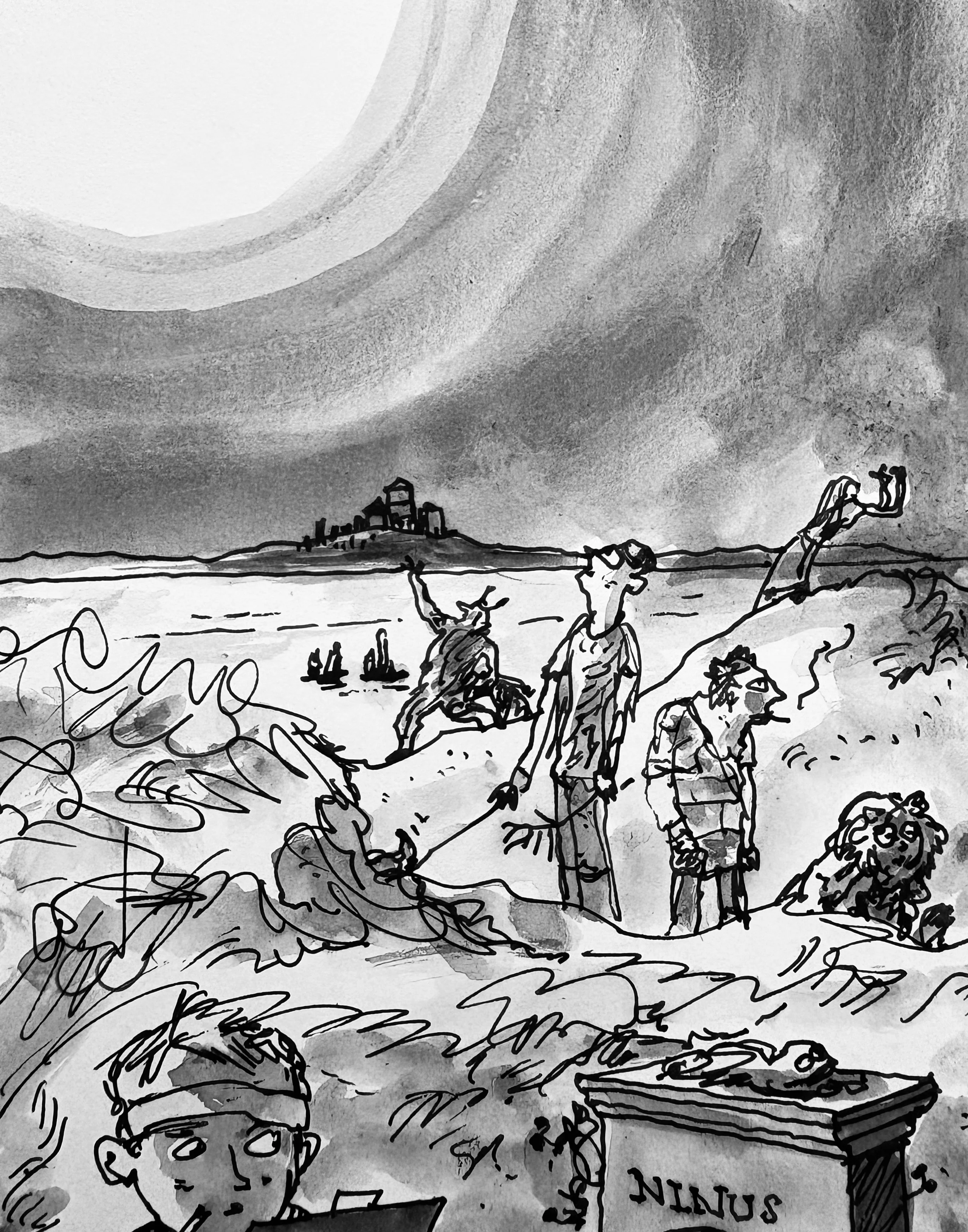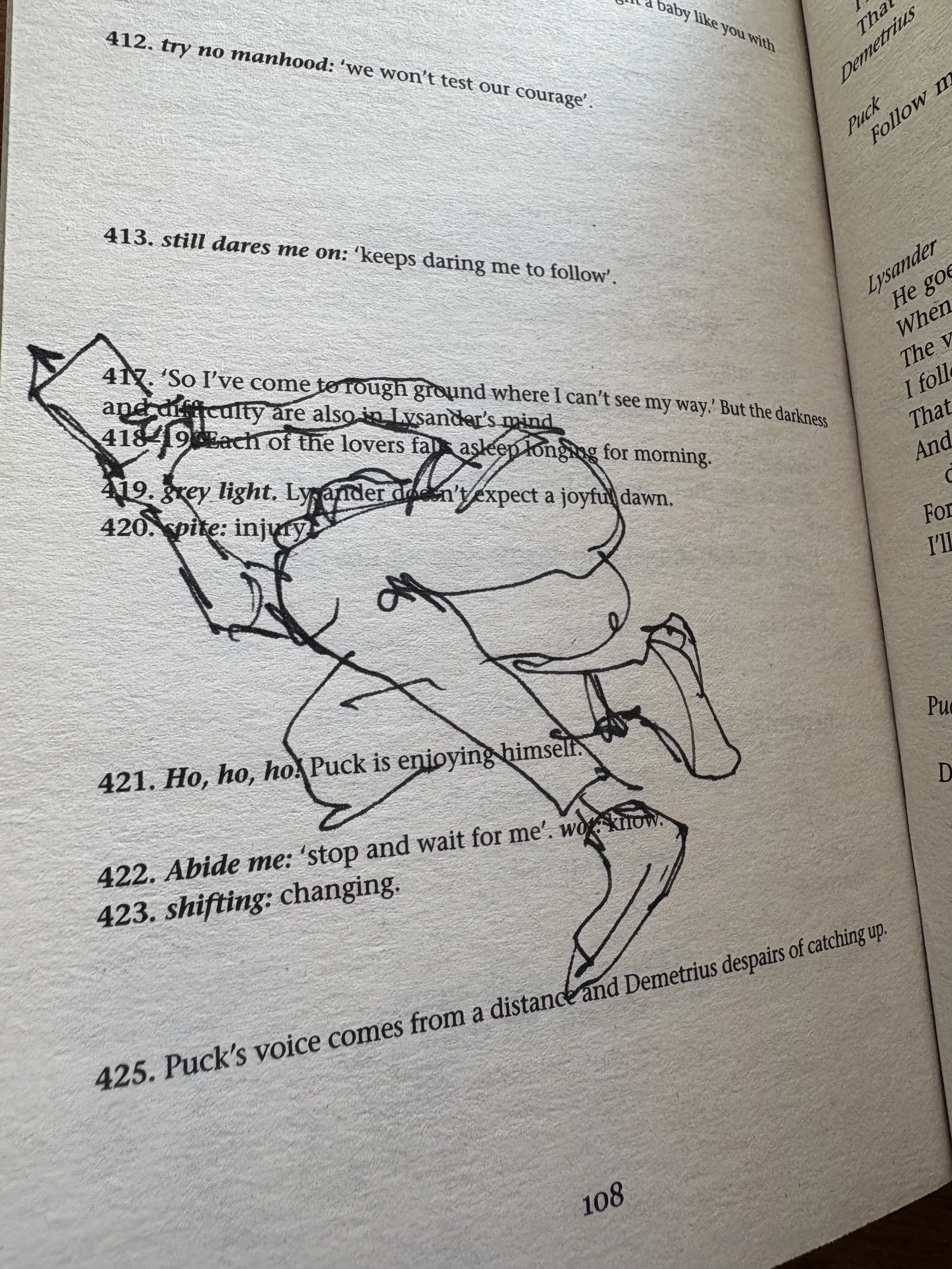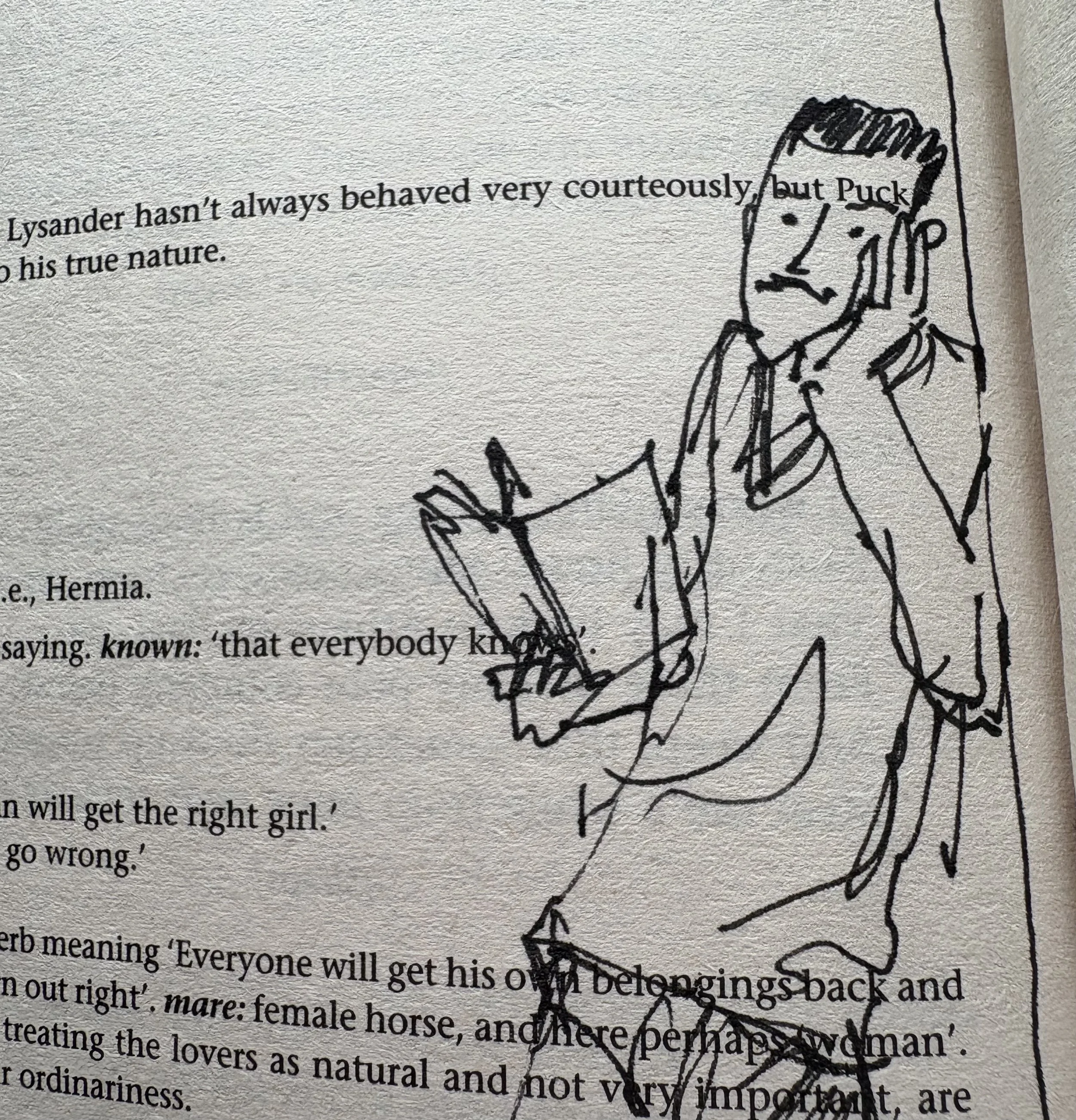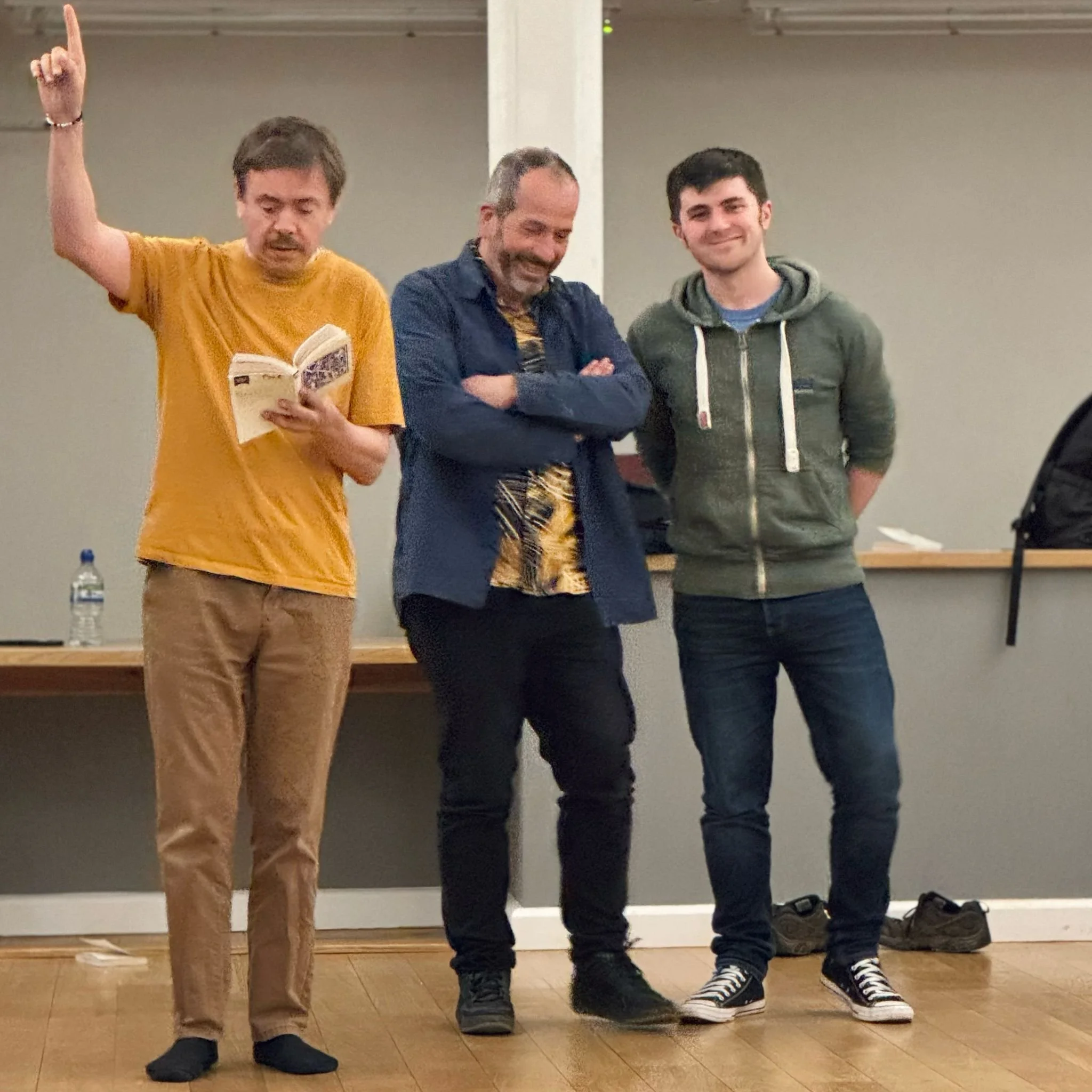Field notes from A Midsummer Night’s Dream with Wildflower Actors Society, Cardiff 2025
Robin Starveling is one of six Mechanicals in Shakespeare’s 1595 comedy set in in an ancient Athens ruled by Duke Theseus, famous in mythology for slaying the Minotaur. It’s a place of strict laws and social codes, set alongside a green world in chaos, teeming with imaginary beings. The tailor Starveling cuts a slight figure, though his name could be ironic. He is a smudge, a sketch rather like one of Inigo Jones’ ante-masque drawings. His half dozen lines suggest a fearful temperament, in contrast to bold and brash Nick Bottom the weaver. The Mechanicals enter a competition to stage an entertainment to celebrate the Duke’s wedding to Hippolyta, Queen of the Amazons.
With only four days to rehearse, their leader Peter Quince chooses Pyramus and Thisbe a short, blunt tragedy. They are immediately hijacked by Bottom’s thespian charisma and desire for public adulation. He wants to perform all the roles, but Quince insists he only plays the lead, Pyramus. Young Flute the Bellows-mender is pressed into playing the female lead, Thisbe. The team try to figure out how to portray a terrifying Lion, a Wall with a chink in it and Moonshine beaming through the trees. They take a rather literal approach, with plenty of disclaimers and trigger warnings for the Ladies of the court.
Loosely drawn. Inigo Jones, Ante-masques (1637)
The Drama
The play is set in motion by a political marriage and the old guard forcing their young into obedience. This propels a quartet of courtly lovers, Hermia, Helena, Demetrius and Lysander into the woods, where their affections are switched by an impetuous sprite Puck acting on behalf of jealous fairy king Oberon. Oberon’s queen Titania has banished him from her bed and is made to fall in love with Bottom, magically transformed mid-rehearsal into an ass to punish her. The natural order is disfigured by jealousy. Enchantment, the law, and theatre itself get used and abused, and The Mechanicals get caught up in the ensuing chaos. To the rescue comes their ineptly staged play (think Marx Brothers) in which Bottom takes ham acting to new heights, Snout the Tinker portrays a Wall, and Snug the Joiner perfects a gently ferocious Lion. Starveling attempts to embody the Man in the Moon, bringing on too many props: a lantern, a bush and an unscheduled dog. The Mechanicals’ honest efforts inspire an outbreak of affection and forgiveness among the court. Nobody dies, but as in Shakespeare’s other comedies, things could easily have taken a tragic turn.
Part of the appeal of A Midsummer Night’s Dream is openness to interpretation. No one theme dominates. Key transformations take place in the main characters but also in shifting relationships between rich folk, fairies and poor artisans. Subversion and enchantment divert, while acceptance and conjugal harmony prevail. The natural and state order are bigger than everyone. Grace wins out.
Figuring out characters’ silhouettes.
What are they making me do?
My initial image of the Mechanicals was clowns. Not zanni or servants, just ordinary tradesmen trying to put on a play, in a hurry, with little experience. They are not caricatured ‘types’ but are exaggerated in their silhouettes and expression, limited by circumstances, disarming not grotesque. We all went in search of the characters and the transformations looked after themselves in performance. Starveling is on stage a fair bit, but like Snug/Lion fairly mute, so all the energy goes into reacting and responding.
The rehearsal process stretched over six months on Monday evenings at Insole Court. Group auditions and the first sessions involved a series of warm-up games and improvisation prior to loose blocking. How the Mechanicals move was set in train by director Nuala who saw us in 1980s aerobics sweat bands and leggings, with ‘the worst rehearsal ever’ as our starting point. Each attempt was very different and the characters and group dynamic evolved naturally. Starveling’s ‘big moment’ comes announcing himself as Moonshine before a pedantic court. It has been suggested that the clown Will Kemp originally played the role in Shakespeare’s troupe, with his real dog. Most productions make do with a toy dog to avoid the hassle and potential chaos. I made a rudimentary puppet on strings with a stuffed toy carefully chosen from charity shops. For the lantern representing the Moon we used a mirror ball. Perhaps Starveling looks at the world askance. His fear of the troupe being executed is justified but his contribution is praised by the Hippolyta towards the end: “The Moon shines with a good grace.” Maybe she hopes to do the same.
Auditioning Starveling’s Dog.
What I learnt
I have enjoyed applying aspects of Meisner technique from a recent course, especially responding to other characters: absorbing, amplifying, deflecting, sending it back. Other Meisner mantras helped: Be in the moment, Let it matter, You don’t need to be interesting, You win by losing, etc. Asking What are they making me do? Starveling is a sponge, perhaps thick-skinned, maybe a bit paranoid. Every line of text, every action is a response. Send it back, pass it on.
It’s useful to play an objective that’s doomed to be derailed by circumstances. Try something different each time. Perhaps adopt an animal quality: “tonight I’m a hare, tomorrow maybe a ferret”. See what turns up. Don’t try to repeat previous success, re-create the play with each audience. The Mechanicals need to move as one, but chaotically, and we achieved that at certain points. Hares run away on a random setting. The logic of chaos.
Fluidity. Starveling goes with the flow, sometimes in a world of his own, at others intensely focused. Use Circles of attention: be alert, inwardly and outwardly. Leave it open. When acting, nobody really knows what you’re thinking. Don’t pin the character down. This play holds plenty of ambiguous space.
Creating light and shade is possible even without dialogue. Some actions attract, others keep people at a distance. Both can work at different moments. A quiet presence can resonate without pulling focus. Starveling counter-balances Bottom. Perhaps that’s it, like the Moon he reflects light onto other characters and places. He is re-directive, like a good illustration, loosely sketched.
Being heard and connected to the space: vocal and physical warm-ups are essential.
SNOUT: Will not the ladies be afeard of the lion?
STARVELING: I fear it, I promise you.
Meanwhile, in another part of the forest…. Fascinating backstage conversations with Paul Rupert (Lion) about ways to train and prepare. Some great ideas for future productions and voice work, to be continued. Charlotte Amodeo’s director’s pitch for Romeo and Juliet in the autumn. Rehearsing for Sister Act with Gethin at Pukka Productions in Barry. (24-26 July at St Cyres in Penarth) A very different kind of acting, with a keep-fit element. Auditions for Hamlet (Everyman) and Ghost Train (PODS). Weekly screen acting classes withnowinaminute, focusing on objectives, subtext, listening, etc. All this forms a backdrop to the production, more cheering than the stream of world events, online bile and the commercialisation of public space in Cardiff. Escapism? No. A form of opposition I think, doing the jobs theatre has always been there to do. The experience feeds into my next pop-up show with poet Luca Paci, Spotting Fascists, a work in progress for the autumn. More anon at https://www.selfhelpisland.com
Glynnasty
Since all dying on stage in Treasure Island with PODS in 2023, the three of us Glynns have been finding opportunities to perform together. Here my wife Ruth plays head fairy, Peaseblossom and our son Gethin plays Flute/Thisbe. We were delighted that Niall Glynn - perhaps a distant relative - played Snout/Wall. Photo: Zara Law.
Midsummer Moonscape. After the tech dress. Controlled chaos.
Galileo Galilei Drawings of the Moon, 1609. Florence, Biblioteca Nazionale Centrale
With thanks to Nuala Lomax and the Wildflower production team, and all the cast for great fun and camaraderie.
Rehearsal photos by Trystan Davies (Assistant Director/Oberon)









